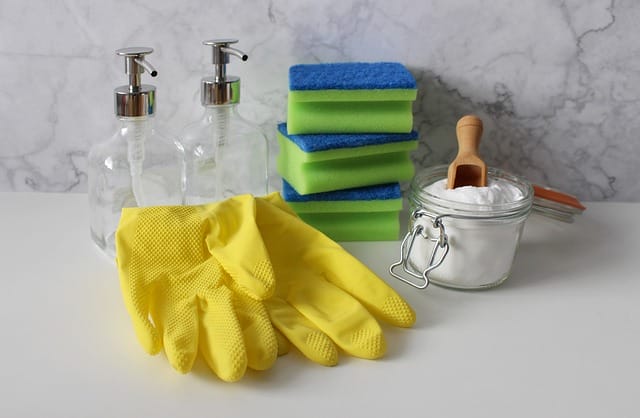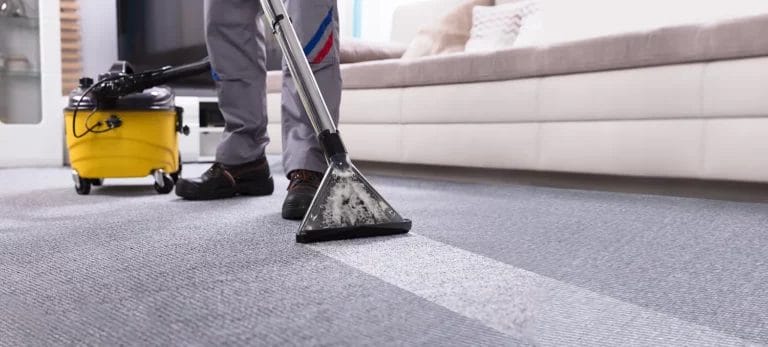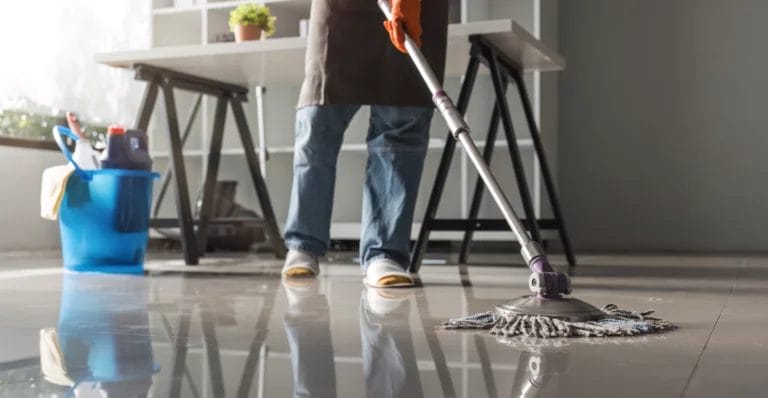Insurance doesn’t have to be complicated — we’re here to help! See the must-have insurance types for your cleaning business, why they matter, and how they help protect your bottom line.
What Is Cleaning Business Insurance?
Cleaning business insurance is a type of small business insurance tailored to cleaners and cleaning businesses. It financially protects your business from common risks that can arise while you’re on the job, whether you’re cleaning offices, homes, or other properties.
It’s designed to cover accidents, damages, and even legal issues, so you can work with peace of mind knowing you don’t have to worry about costly expenses if something goes wrong.
What Types of Cleaning Business Insurance Does Insurance Canopy Offer?
You need insurance whether you’re a one-person operation or you have a cleaning business with a team of employees. Insurance Canopy has tailored policies for you depending on your primary services:
Why Do Cleaning Businesses Need Insurance?
Accidents and unexpected events can happen no matter how careful you are. Having insurance means you’re covered when they do. For example:
- A client slips on a wet floor you just mopped and sues you for medical expenses.
- You accidentally knock over and break an expensive piece of art in a client’s home.
- Someone steals your cleaning equipment from your vehicle.
- One of your employees gets injured while lifting a heavy piece of equipment.
- Your online data system that stores client information gets hacked.
What Does It Do?
Insurance can help you land more work, build your reputation, and protect your business financially by:
- Covering costs related to third-party injuries
- Paying for repair or replacement for third-party property damage claims
- Promoting your reputation as a trustworthy business
- Meeting the requirements of contracts for clients, landlords, and more
And that’s just the base policy. From there, you can customize your coverage with options that cover even more:
- Tools & equipment coverage can pay to replace/repair your tools and equipment if they are stolen or damaged
- Workers compensation pays for lost wages and medical bills if one of your employees gets hurt on the job, taking care of your employees’ medical bills.
- Cyber liability covers costs to help you recover from data breaches and cyber attacks
- Commercial auto insurance can pay for expenses if your company vehicle gets into an accident or is stolen.
Is It Legally Required?
In most cases, cleaning business insurance is not legally required, but there are situations where it will be required by others:
- Client contracts: Many clients or businesses require proof of insurance before hiring you.
- Landlord contracts: It’s not uncommon for someone to require you to provide proof of general liability coverage before renting you retail, office, or storage space.
- State requirements: If you have employees, some states require workers compensation insurance. Also, if you use vehicles for your business, you might need commercial auto insurance to protect both your vehicles and the people driving them.
Even if insurance isn’t legally required, it’s a smart move to have it — going without it can cost you big. It also shows you’re a responsible and professional business owner, and builds trust with clients. When they know you’re insured, they’re more likely to feel confident in hiring you and referring you to others.
What Is a Janitorial Service Bond?
A janitorial service bond is a type of fidelity bond that protects your clients if an employee damages property, steals items, or behaves dishonestly while cleaning.
If this happens, the bond ensures that the client is reimbursed for their loss. Your cleaning business is responsible for paying the bond company back the amount reimbursed to the client.
Why Do Cleaning Businesses Need to Be Bonded?
Client trust is the foundation of working with your business, from getting repeat bookings to word of mouth referrals. But it can be quickly broken if a dishonest employee:
- Takes office equipment from a client’s office
- Breaks a client’s expensive furniture while cleaning
- Steals an expensive piece of jewelry from a client’s home
Being bonded signals that your business stands behind its work, and that clients won’t suffer a loss when they choose to work with you. Some clients might even require your business to be bonded as part of your contract.
If an incident occurs, a bond can:
- Reimburse clients for theft or damage
- Build trust with your clients
- Meet contract requirements
- Help you stand out from the competition and land more work
Are Bonds Legally Required?
Generally, being bonded isn’t required by law, but there are situations where it might be necessary:
- Client requirements: Many clients, especially businesses, ask for a bond before they hire you.
- Contract terms: Certain contracts, particularly with larger organizations, stipulate that you must be bonded to ensure protection against potential theft or damage.
While it may not be required by law, a janitorial service bond provides extra protection for your clients and highlights your commitment to quality and responsibility.
What Types of Insurance Do Cleaning Businesses Need?
These are the main types of insurance for cleaning businesses:
General Liability Coverage
General liability insurance protects your business against third-party property damage or injuries that happen because of your work. If a client gets injured or an item gets broken, your coverage will help pay for the costs. This could include things like medical bills, repairs, or legal fees if someone sues you.
But keep in mind, it only covers accidents caused by your work — not things like damage to your own equipment, employee injuries, or issues caused by subcontractors.
What’s covered?
- Third-party injuries: If a client or other third party else gets hurt because of your cleaning services, the insurance covers medical bills and related costs.
- Property damage: If you accidentally damage property belonging to a third party, the insurance covers the repair or replacement costs.
- Legal costs: If you’re sued because of an accident or damage, your insurance can also cover legal fees.
What’s NOT covered?
- Theft: It doesn’t cover theft by your employees or anyone else involved in your cleaning services. (That’s a bond’s job.)
- Employee injuries: If one of your employees gets injured while working, their medical expenses won’t be covered under this policy. (You need workers compensation for that.)
- Damage to your own tools and equipment: If your equipment or tools are damaged, this doesn’t cover the cost to repair or replace them. (Think tools and equipment insurance.)
- Subcontractor issues: Your policy won’t cover issues arising out of the work of subcontractors.
Tools and Equipment Coverage
Also known as inland marine insurance, this policy protects the tools and equipment essential for cleaning jobs. If your tools or equipment are damaged or stolen while on the job, your insurance will help pay for replacing or fixing them. This ensures that your cleaning services can continue smoothly without unexpected equipment costs.
What’s covered?
- Damage to your tools and equipment: This covers repair or replacement if your tools get damaged while being used or transported.
- Theft of your equipment: If tools are stolen while you’re on the job, this insurance will help replace them.
What’s NOT covered?
- Employee theft: Theft of equipment by employees isn’t covered — Consider a bond for that.
- Wear and tear: It doesn’t cover normal wear and tear or damage from misuse or neglect.
- Mysterious losses: Equipment that goes missing without a clear cause or explanation, such as “disappearing” without evidence of theft (and a filed police report), is not covered.
Additional Insureds
Adding additional insureds to your policy extends your coverage to other qualified individuals or businesses (like property managers or the owner of an office building). It’s often required to work with commercial clients, in particular.
What’s covered?
- Protection for others: If your client or a subcontractor is named as an additional insured, your insurance will cover them if they’re held liable due to your actions on the job.
- Legal expenses: If an additional insured is sued as a result of your work, the policy will help cover the legal costs.
What’s NOT covered?
- Non-work-related actions: Additional insureds are only covered for claims related to your work, not for unrelated incidents on their own.
- Insurance from other parties: If an additional insured has their own insurance, only the primary insurance will pay.
Workers Compensation Coverage
If an employee gets hurt on the job, workers compensation covers medical expenses, rehabilitation, and even lost wages while they recover. This makes sure your employees are taken care of without having to sue your business for injuries.
What’s covered?
- Employee injuries: If one of your employees gets injured or becomes ill due to their job, workers compensation will cover costs for lost wages, medical bills, rehab, and more.
- Death benefits: If an employee passes away due to a work-related injury or illness, workers compensation can provide compensation to their family.
What’s NOT covered?
- Non-work-related injuries: If the injury or illness isn’t caused by work, it won’t be covered.
- Self-inflicted injuries: If an employee injures themselves intentionally, workers compensation usually won’t cover it.
Commercial Auto Coverage
If your business vehicle is involved in an accident, gets damaged while on the job, or is stolen, commercial auto insurance helps pay for repairs, replacement, medical bills, or legal fees. Make sure you have this coverage if you’re using vehicles for business — personal auto insurance often excludes business activities.
What’s covered?
- Vehicle damage: Covers the cost to repair or replace your business vehicle if it’s damaged in an accident.
- Liability: If your employee causes an accident in a business vehicle, it covers medical bills and property damage to others.
- Theft: If your vehicle or its contents are stolen, this insurance helps replace them.
What’s NOT covered?
- Personal use: If the vehicle is used for personal reasons and not for business, it’s not covered under a commercial auto policy.
- Driver negligence: If the driver was intoxicated or committing a crime at the time of the accident, costs may not be covered.
Cyber Liability Coverage
Cyber liability insurance protects your business from online threats. If your computer system or any online data gets hacked, this insurance helps cover the costs of fixing the issue, informing affected parties, and any legal fees that come from the breach.
What’s covered?
- Data breaches: Covers costs to notify customers and fix the data breach.
- Business interruption: If a cyber event causes your business to shut down temporarily, it covers lost income.
- Legal fees: If you’re sued due to a cyber breach, this insurance helps cover the legal expenses.
What’s NOT covered?
- Physical property damage: It doesn’t cover damage to physical property. This is only for digital risks.
- Employee errors: If an employee makes a mistake that leads to a breach, this policy may not cover it without certain conditions.
How Much Does Insurance Cost for Cleaning Businesses?
We offer liability coverage starting at $39 per month or $435 annually — well below the national average of $520 per year. No wonder cleaning businesses choose Insurance Canopy!
Take a look at this snapshot of common cleaning business insurance costs:
Coverage | Average cost |
General liability | $679.92 per year |
Tools and equipment | $51.64 per year |
Janitorial service bond | $131 per year |
Workers compensation | $1,141.86 per year |
Cyber liability | $99 per year |
*Based on average costs paid by Insurance Canopy customers.
Questions Cleaners Ask Us About Insurance
How do I apply for cleaning business insurance?
To apply for insurance with Insurance Canopy, simply fill out the online application form. Be ready to provide details about your business, including your services, employees, and the size of your operation. Once your application is submitted, you’ll receive a personalized quote tailored to your needs.
How do I add an additional insured to my policy?
To add an additional insured to your policy, log into your account online. Provide the name of the entity you wish to add (such as a client, property manager, or business partner), and we’ll update your policy accordingly.
If you have any questions, you can also contact us.
Can I access my insurance documents online?
Yes! Insurance Canopy makes it easy for you to access all your insurance documents online. Log into your account dashboard to view, download, or print your policy documents, certificates of insurance, and other important information related to your coverage.
How do I manage and update my policy?
To manage or update your policy, log into your Insurance Canopy account. From there, you can make changes to your coverage, update your business info, or add or remove coverage options. If you need assistance, our customer support team is always available to help.
You can also learn more about your cleaning business insurance policy here.
How can I file a claim with Insurance Canopy?
Filing a claim with Insurance Canopy is easy! You can file a claim online through your account by after clicking on “file a claim”. Be ready to provide all the necessary information, including details of the incident, any supporting documents (like photos or police reports if applicable), and any other required information.
Our claims team can also guide you through the process to ensure a smooth resolution.

Common Insurance Questions Related to Business Size
Do I need insurance and bonding if I’m a solo cleaner?
Yes, even solo cleaners need insurance! General liability insurance is a must to cover third-party injuries and property damage that might occur while you’re working, no matter how careful you are.
Bonding is often required by clients. Even if not required, it gives your clients additional peace of mind by showing you’ll be accountable for any theft or dishonesty. Both can help protect you financially and build trust with clients.
Do I need insurance and bonding if I work only for one client?
Even if you only work for one client, it’s still a smart move to have insurance and bonding. Accidents, dishonesty, or damage can happen no matter how small the job is, and having coverage can protect you from unexpected costs. Being bonded and insured can prevent financial strain if something goes wrong, no matter the size of your client list.
Should I adjust my coverage if I expand my service area?
Yes! Growth factors like higher revenue, more employees, or new services can impact your premium. You might need to:
- Increase your general liability limits
- Add commercial auto insurance if you’re driving more
- Adjust coverage for more employees
- Get bonded for certain contracts
- Add cyber insurance if handling more client data
Your coverage should grow with your business, so review your insurance needs any time you expand.
Legal Insurance Questions
Will my insurance cover legal fees if I’m sued?
Yes, insurance typically covers your legal fees if you’re sued for claims covered by your policy. This can include the cost of hiring a lawyer, settlements, damage awards, and court fees up to the coverage limits of your policy..
What happens if my client claims damage to their property?
If a client claims you damaged their property, your general liability insurance can cover the costs for repair or replacement, depending on the specifics of the claim.
What are common claims in the cleaning industry?
Common cleaning insurance claims include:
- Property damage: A cleaner accidentally damages a client’s property, such as breaking furniture, damaging floors, or spilling something on a carpet.
- Third-party bodily injury: Someone other than you or your employees slips, trips, or falls while you’re cleaning their home or business, suffers an injury due to something in your cleaning equipment, or has an allergic reaction due to cleaning products used.
- Theft: Clients may claim that you or an employee took something from their property. Your bond can compensate your client, ensuring trust and protecting your reputation.
- Mistakes in cleaning services: Cleaning products can damage surfaces or leave a residue, leading to a claim for poor-quality work or repairs.
- Employee injuries: A cleaning employee can get hurt while working.
Get Your Cleaning Business Coverage Now!
From the basics to more specialized coverage, knowing what you need now can save you a lot of trouble later on. Ready to protect your business? Get a free quote today and make sure you have the coverage you need.





